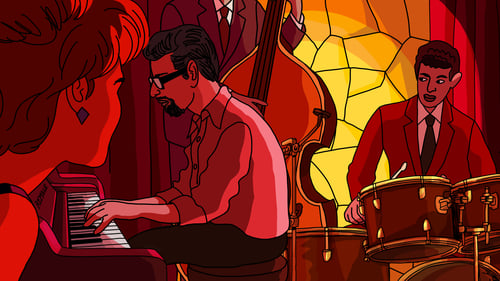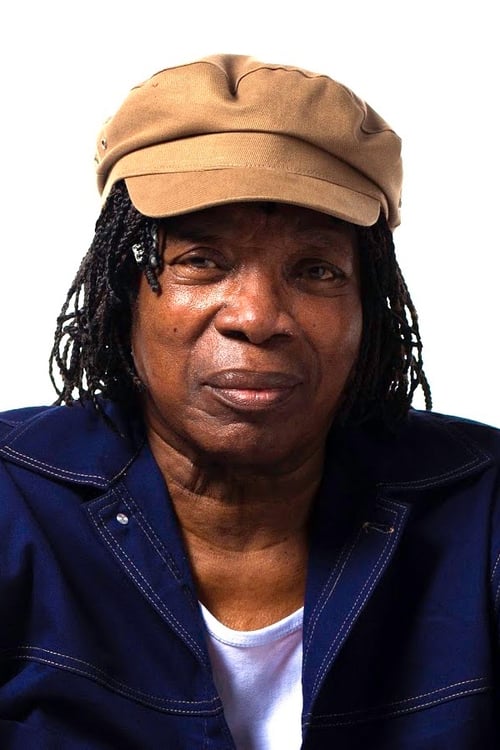Milton Nascimento
Historia
Milton Nascimento is a prominent Brazilian singer-songwriter and multi-instrumentalist, known globally as one of the most influential and talented brazilian musicians. Elis Regina once stated that "if God had a voice, it would be Milton's".

Self (voice)
Nueva York, 2010. Jeff Harris, un periodista musical, se propone descubrir la verdad sobre Francisco Tenório Júnior, un joven pianista brasileño de samba-jazz que desapareció en Buenos Aires el 18 de marzo de 1976.

Songs
After eating a bad apple, consequences such as guilt may appear.

Self

Self
The impact of Ney Matogrosso's performances on his audience and the reverberation of that impact on Brazilian culture, from the second half of the 20th century to the present. An audiovisual anthology, all composed of archival images. The best way to get to know Ney is to be with him on stage.

Self (archive footage)
The special documentary celebrates Elis Regina's 75th birthday and makes a parallel between Elis' extremely prevailing thoughts with those of João Marcello Bôscoli, Pedro Camargo Mariano and Maria Rita, her children, answering the same questions in the present time. All three talk about their childhood, their relationship with Elis and her artistic career.

Self
Dorival Caymmi was one of the inventors of the Bahian imagination. In his 94 years of life, Caymmi composed, sang, wrote, illustrated and thought about his Bahia, even far from it. His family, partners, friends and fans remember his history, which made him one of the pillars of Brazilian culture.

Self

Self - Performer
Chico Buarque is a constant presence in Brazil's art scene and makes up its citizen's popular culture. This wealth in music, poems, theater and novels has been created over the last 50 years and in this film Chico Buarque converses about his memories, shows, daily life, work methods, creative process, in summary all his trajectory. The musician’s search for his German brother, whom he never got to meet, serves as one of the axis for the narrative.

Music
Nando, a 12 year old boy, narrates the adventures of his father Antonio, during the 60s in Brazil, who leaves the inland of the state of Minas to go to Brasília, a recently inaugurated city, but still with construction works in progress.

Orphaned by father and mother, Clara has always dreamed of building a singing career. At the age of 16, she moved to Belo Horizonte, where she won the ABC Golden Voice contest. In 1966, she recorded her first vinyl: A Adorable Voice by Clara Nunes. The approach to samba made her achieve the longed for success, in addition to international repercussion. Clara Nunes revolutionized the music industry, becoming the first woman to break the barriers imposed by the record label.

Lara

Songs

Musical
Panair do Brasil revives the story of the most important commercial aviation company in Brazil, between 1930 and 1965, with its commercial daring in establishing routes to the four corners of a continental country, taking the adventure of air transport to never-before imagined places, as well as the first international routes. Four decades after it closed its doors, it still retains a marked presence in the country's collective imagination for its pioneering spirit and stories of heroic deeds and for the bewilderment which was aroused by the facts surrounding its closure during the military regime.

Self
Elis was complete, she had all the attributes which differentiated simple artists from stars. She could enchant crowds in her albums, concerts and in video. Her music was always associated to the stage, site she mastered with brilliance. Throughout her career, these stages would open to her, from the radio days to the Montreux Jazz Festival. This film shows her magic relationship with stage and audience. And also the Bandeirantes theatre, her last stronghold. There she shone in life with her greatest success in theater, the show 'Falso Brilhante', which is also presented and entitles this film. There her body was veiled and her audience went to meet her for the last time, now for a farewell.

Himself
Documentary about Marcel Camus' 1959 film Black Orpheus, its cultural and musical roots, and its resonance in Brazil today.

Cantor do Realejo
Fortune takes four human beings to the last frontier of passion. There, where love becomes almost inhuman and divine. As if he was a comet, Rafael, the traveler, appears at the party for the cities patron saint, in a small town in the interior of Minas Gerais. He is the one who brings passion and crime, vanishing afterwards, leaving a poetic feeling in the air, which is always deadly to the ones who stay. Mrs. Ana de Lara, the proud rich widow, and Missy, still a child, whose beauty and innocence are like the Tiê-Sangue, a red bird, are the travelers victims. There is also Master Juca do Vale, a criminal, whose passion turns him incredibly human, in this story of love, death, forgiveness and resurrection.

Music
Four love stories which portray a wide gamut of emotions and desires against the backdrop of Rio de Janeiro. "Elephant's Stomp" : the story of a highway patrol officer who is infatuated with a mulatto dancer at a local nightclub. "Drao" : a publicity man and a boutique owner who face a crises in their marriage. "You Are Beautiful" : two homeless teenagers seek love amidst their personal misery. "Samba of the Great Passion" : a book maker who is charmed and captivated by the voice of a female singer coming from a building across the street. Characters in search of love in order to escape from the boredom, loneliness and helplessness of their lives.

Original Music Composer
After an extended period directing original screenplays, dos Santos returned to the creative engagement with literature that was the wellspring of his early masterpieces, offering a combinatory adaptation of five stories by the renowned Brazilian novelist João Guimarães Rosa. Openly embracing a mode of magical realism, dos Santos' celebrated film tells the story of a farming family defined by the absence of its father who abruptly abandoned his wife and children, sailing away down the river, including his son who continues to communicate with his father, speaking daily to him from the river bank. While offering an evocative vision of rural Brazil as a timeless land of mystery and solemnity, The Third Bank of the River is also bitingly satiric in the remarkable depiction of religious belief when the family moves to the city and its youngest member, a mesmerizing little girl, is revealed to be a kind of saint, capable of miraculous acts. -Harvard Film Archive

Feat. Herbie Hancock, Milton Nascimento, Al Jarreau Miki Howard & The Select Live Special Band, David Sanborn and Marcus Miller Herbie Hancock: 1 Jack In
Milton Nascimento: 2 Txai 3 Yauarete
Bola de Meia, Bola de Gude: 4 Nos Bailes Da Vida 5 Maria Maria
Al Jarreau: 6 Spain 7 Everybody Is a Star 8 Hey Jude
David Sanborn: 9 Soul Serenade 10 Chicago Song
Marcus Miller: 11 Run for Cover 12 Bones Jive 13 Someday We'll All Be Free 14 Burnin' Up the Carnival

Original Music Composer
The story of João "Jango" Goulart, the Brazilian left-wing president deposed by the military.

Chefe Zequiel
The film shows the drama of the young and fragile Lalinha. After being abandoned by her husband, who ran away with another, the girl seeks comfort on the farm where the two in-laws live and the widowed father-in-law. There, the girl discovers a new world.

Himself
A TV reporter tries to find out who is killing prostitutes in a São Paulo neighbourhood.

Music

Opera House Blackman
Fitzcarraldo es un soñador que planea construir un teatro de ópera en Iquitos, en la Amazonía peruana, así que, para financiar su proyecto, se embarca en una aventura épica para recolectar caucho, un producto muy rentable, en una región remota e inexplorada de la selva.

Self
The picture brings interviews with the participants of the 1st São Paulo Jazz Festival that occurred in Anhembi Conventions Palace in September 1978 and reunited musicians, composers and singers from all around the world.

Self

Music
An accident at a construction site, resulting in one death, sets one worker off on a struggle for justice that exposes the mechanisms of exploitation and the class relations of a country that had undergone one decade of fast-paced ‘conservative modernisation’ at the hands of the military. As a sort of sequel to the classic The Guns (1964), following the fate of those characters as they move from enforcers of exploitation to exploited, it offers more than a snapshot of the period: the correspondent time lapses in fiction and reality capture the passage of a chunk of Brazilian history between the two films, and, therefore, also the transformations in cinematographic approaches to the social and political between the two moments. Equally daring in content and form, and in the originality of the adequacy of one to the other, it won the Silver Bear at Berlin.

Compositor
A documentary that presents home movies and several excerpts of known films of famous actress Leila Diniz. Friends of the late actress, tragic killed on a plane crash in 1972, discuss about her life, her work and her legacy in Brazilian culture.

Original Music Composer
A professor faces a double of himself and hires a detective to find out who that is and what are his real intentions.

Sugestives images about the music A Nova Estrela by Wagner Tiso.

Dim Dum
In the 1930s, in the South of State of Bahia, Brazil, an adventurer with no name or history, who has already been shot seven times, gets involved in the battle for land and cacao plantations. His plan is to take the place of "Colonel" Santana, taking his wife and money. He starts a bloody conflict, in which many simple people and landowners die.

Original Music Composer
In the 1930s, in the South of State of Bahia, Brazil, an adventurer with no name or history, who has already been shot seven times, gets involved in the battle for land and cacao plantations. His plan is to take the place of "Colonel" Santana, taking his wife and money. He starts a bloody conflict, in which many simple people and landowners die.















